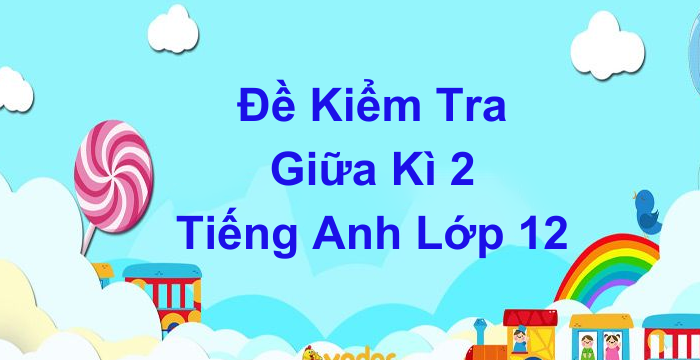Đề Kiểm Tra Giữa Kì 1 Tiếng Anh Lớp 12 Global Success (10.01.2025)
Thầy Thắng
KIỂM TRA GIỮA KÌ LỚP 12
15
Ngày đăng: 10-01-2025 17:06:01

ĐỀ KIỂM TRA GIỮA KÌ I
Trường THPT Hòa Vang, TP Đà Nẵng, 2024 - 2025
thời gian làm bài: 50 phút
Mã đề: 101
Read the following advertisement and mark the letter A, B, C, or D on your answer sheet to indicate the option that best fits each of the numbered blanks from 1 to 6.
Learning To Enjoy Nature
"Will I find anything interesting here? Will I get lost if I wander too far (1) ______ ?" These are some questions you may have before starting a nature (2) ______. But don't worry! A new app called "Nature Map" is here to ease your concerns. Simply open the app, and you'll find interactive maps, useful tips, (3) _____ information about plants, animals, and trails as you go. You can even use the "Find a Friend" feature to see other users' (4) ______ nearby and connect with them. If you (5) ______ talking to people with similar interests or sharing your discoveries, Nature Map makes it easy for you to (6) ______ new friends while exploring
Question 1: A. away B. above C. around D. forward
Question 2: A. exploring B. explorer C. explore D. exploration
Question 3: A. but B. and C. or D. nor
Question 4: A. value B. property C. locations D. houses
Question 5: A. want B. hate C. prefer D. hope
Question 6: A. take B. make C. follow D. create
Read the following passage and mark the letter A, B, C, or D on your answer sheet to indicate the option that best fits each of the numbered blanks from 7 to 12.
Simple Ways to Save Energy at Home
Saving energy is not only good for the environment but also helps to save money. Here are a few ways you can (7) _____ energy every day:
- Switch to LED lights, which use much less electricity (8) _____ traditional bulbs. They also last longer, which saves you money in the long run.
- When washing clothes, try to use cold water whenever possible. Heating water takes a lot of energy, and cold washes (9) ________ just as effective for many loads.
- Don't leave your electronic devices on standby mode; instead, turn them off completely. This prevents a lot of energy from being (10) ______
- Finally, remember to (11) _______ the heating or air conditioning when you leave the house.
Making these small changes will help you (12) ______ both energy and money every month!
Question 7: A. conserve B. store C. produce D. collect
Question 8: A. then B. rather C. than D. like
Question 9: A. can be B. are being C. to be D. being
Question 10: wasted B. kept C. reduced D. saved
Question 11: A. turn up B. turn down C. turn off D. turn on
Question 12: A. earn B. spend C. reduce D. save
Mark the letter A, B, C, or D on your answer sheet to indicate the best arrangement of utterances or sentences to make a meaningful exchange or text in each of the following questions from 13 to 17.
Question 13:
A. But this time, I think I'll add more examples and visuals to make it more engaging.
B. I've given presentations on this topic before.
C. My goal is to make sure the audience understands the key points.
A. a-b-c B. b-a-c C. b-c-a D. c-a-b
Question 14:
A. First, reading books helps improve vocabulary and grammar skills.
B. In conclusion, reading regularly encourages critical thinking and enhances creativity.
C. It is believed that reading books has a positive impact on students' learning.
D. Second, students who read often are better at understanding complex concepts.
E. Finally, reading books broadens students' horizons and allows them to explore new ideas.
A. b-a-c-d-e B. a-b-c-e-d C. b-c-a-e-d D.c-a-d-e-b
Question 15:
A. Lisa: Not yet, but I'm brainstorming. I want something catchy and unique.
B. Mark: That sounds interesting! What would you write about?
C. Lisa: I'd focus on traveling and photography. I want to share my experiences and tips with others.
D. Mark: That's a great idea! A lot of people are interested in that. Have you decided on a name for it?
E. Lisa: I've been thinking about starting a blog.
A. e-b-c-d-a B. a-c-d-e-b C. b-a-d-c-e D. a-d-b-c-e
Question 16:
A. Sam: What's it about?
B. Lucy: It's on environmental sustainability. I've done a lot of research, but I'm afraid I'll forget everything when I'm up there.
C. Lucy: I'm so nervous about my presentation tomorrow.
D. Sam: Don't worry! You've prepared well, and I'm sure you'll do great. Just take deep breaths and focus on one point at a time.
E. Lucy: Thanks, Sam. I'll try to stay calm and remember your advice.
A. a-b-c-d-e B. b-c-a-d-e C. a-c-b-e-d D. c-a-b-d-e
Question 17:
A. Dear Ms. Johnson,
B. I am writing to express my interest in the Customer Service Representative position at ABC Corporation. I believe my experience in customer service aligns well with the requirements of this role.
C. Thank you for considering my application. I look forward to the opportunity to discuss my qualifications further.
D. Sincerely,
John Doe
E. My resume is attached for your review, and I am available for an interview at your convenience.
A. a-b-e-c-d B. a-c-d-e-b C. b-a-d-c-e D. a-d-b-c-e
Read the following passage about Green Living and mark the letter A, B, C, or D on your answer sheet to indicate the option that best fits each of the numbered blanks from 18 to 22.
Green living is a lifestyle that encourages environmentally-friendly choices and sustainable habits. (18) ______, the goal is to reduce waste, conserve natural resources, and minimize pollution. People who practice green living often (19) _______, such as recycling, reducing energy consumption, and using eco-friendly products.
One of the most effective ways to live a greener life is to focus on reducing waste. (20) ______, buying items with minimal packaging and composting food scraps can help cut down on household waste. In addition, many people tend to (21) _____, like biking, walking, or using public transportation, instead of driving.
Green living also promotes the use of renewable energy sources. (22) ______, such as solar or wind power, helps decrease reliance on fossil fuels and reduces greenhouse gas emissions. Living a green lifestyle can have a positive impact on both personal health and the environment.
(Adapted from Eco-Friendly Lifestyle Guides)
Question 18. A. To begin with B. Although C. In contrast D. As a result
Question 19. A. take steps to improve their diets
B. try to use sustainable practices
C. spend time in nature
D. grow their own food in the city
Question 20. A. For example B. Instead C. Likewise D. On the contrary
Question 21. A. create more waste B. adopt convenient travel options
C. choose eco-friendly transportation D. reduce plastic consumption
Question 22. A. Switching to energy-efficient light bulbs
B. Growing organic vegetables in the backyard
C. Using renewable energy sources
D. Eating more plant-based meals
Read the following passage and mark the letter A, B, C, or D on your answer sheet to indicate the best answer to each of the following questions from 23 to 30.
Developing good study habits is essential for academic success. Effective study habits not only help you absorb information more efficiently but also make the learning process more enjoyable and less stressful. To create good study habits, it's important to start with organization and planning.
The first step is creating a study schedule. Setting aside specific times each day for studying ensures that you stay on track and avoid last-minute cramming. It's essential to give priority to tasks based on their difficulty or deadlines. By following a schedule, you create a routine, which helps your brain associate study time with productivity.
Another key element is a distraction-free environment. Find a quiet place where you can focus without interruptions. Keeping all necessary materials within easy access is also important, so you don't waste time looking for books or notes. A clean, organized study space helps to maintain concentration and encourages a positive mindset.
Lastly, taking breaks is equally important. While it may seem counterintuitive, giving yourself time to relax can actually help you retain information better. Breaks allow your mind to rest and recharge, so you can return to your studies with renewed energy.
By developing a study schedule, eliminating distractions, taking breaks, and regularly assessing your progress, you can build habits that lead to academic success. When these habits become second nature, you'll find that studying becomes less overwhelming and more rewarding.
(Adapted from Study Skills for Success)
Question 23. Which of the following is NOT MENTIONED as a tip for developing good study habits?
A. Creating a study schedule
B. Taking breaks during study sessions
C. Find a quiet place where you can focus
D. Studying in groups
Question 24. The word "essential" in paragraph 1 is CLOSEST in meaning to _______
A. optional B necessary C. unimportant D. complicated
Question 25. The word " their" in paragraph 2 refers to _____
A. times B. deadlines C. schedules D. tasks
Question 26. Which of the following could best replace "distraction-free" in paragraph 3?
A. modern B. romantic C. noisy D. peaceful
Question 27. Which of the following best paraphrases the underlined sentence in paragraph 4?
A. Resting often helps you be happier.
B. Breaks can help you feel more energized for studying.
C. Taking breaks leads to better relationships.
D. Short breaks can be distracting and unproductive.
Question 28. Which of the following is TRUE according to the passage?
A. Cramming before exams is essential for success.
B. Distractions can be eliminated by studying in groups.
C. Good study habits help studying become less stressful
D. A disorganized study space encourages focus.
Question 29. In which paragraph does the writer discuss the importance of the learning environment?
A. Paragraph 1 B. Paragraph 2 C. Paragraph 3 D. Paragraph 4
Question 30. In which paragraph does the writer mention the ability to retain information?
A. Paragraph 1 B. Paragraph 2 C. Paragraph 3 D. Paragraph 4
Read the following passage about the importance of sleep and mark the letter A, B, C, or D on your answer sheet to indicate the best answer to each of the following questions from 31 to 40.
Good sleep is important for both body and mind, but many people have trouble getting it. Adults need 7-9 hours of quality sleep each night, but things like work, screens, and stress often interfere. Research shows that poor sleep over time can lead to health problems, like a weaker immune system, weight gain, and a higher risk of heart disease.
A regular sleep schedule can help. [I] A relaxing bedtime routine can signal to the brain it's time to wind down. [II] Avoiding caffeine and reducing screen time in the evening also helps, [III]as blue light from screens can stop the body from making melatonin, a hormone that helps you sleep. [IV]
Some people try to catch up on sleep over the weekend, but experts say this doesn't really work. Instead, slowly improving sleep habits is a better solution. Simple changes, like adjusting room temperature or using blackout curtains, can also help. Making sleep a priority is key for good health and productivity.
Question 31. The word it in paragraph 1 refers to ______
A. achieving good sleep
B. the average adult
C. screen time
D. health problems
Question 32. The word interfere in paragraph 1 could be best replaced by ______
A. benefit B. hide C. support D. disrupt
Question 33. Which of the following is NOT MENTIONED as a strategy for improving sleep quality?
A. Avoiding caffeine before bed
B. Keeping a regular sleep schedule
C. Drinking warm milk before bed
D. Reducing screen time in the evening
Question 34. Where in paragraph 2 does the following sentence best fit?
Going to bed and waking up at the same time every day helps keep the body's internal clock steady.
A. [I] B. [II] C. [III] D. [IV]
Question 35. Which of the following best summarizes paragraph 2?
A. The role of melatonin in sleep patterns
B. Creating a consistent routine and relaxing pre-sleep habits to improve sleep quality.
C. Going to bed early to get a full night's sleep
D. The importance of sleep for both mental and physical health
Question 36. The word catch up on in paragraph 3 is OPPOSITE in meaning to _______
A. make up for B. ignore C. fulfill D. benefit
Question 37. Which of the following is TRUE according to the passage?
A. The average adult requires fewer than 6 hours of sleep per night.
B. Reducing screen time before bedtime can help improve sleep quality.
C. Sleep deprivation has no long-term effects on physical health.
D. Catching up on sleep during the weekends is sufficient for recovery. X
Question 38. Which of the following best paraphrases the underlined sentence in paragraph 2?
A. A relaxing bedtime routine helps the brain work better.
B. A calming bedtime routine helps the brain have more relaxation
C. A relaxing bedtime routine helps the brain know it is time to relax.
D. A calming bedtime routine helps the brain stop thinking.
Question 39. Which of the following can be inferred from the passage?
A. Melatonin production is unaffected by blue light from screens.
B. Prioritizing sleep may improve both health and work efficiency.
C. The average adult's sleep needs vary greatly.
D. Establishing a routine is unnecessary for quality sleep.
Question 40. Which of the following best summarizes the passage?
A. How caffeine and screens affect sleep
B. The role of room temperature in maintaining sleep quality
C. The benefits of natural light exposure
D. The importance of improving sleep quality for better health and productivity
MAKE A COMPLETE SENTENCE USING THE PROMPTS.
1. Plastic / take/ hundreds/ years/ decompose/ the ground.
-> ______________________________
2. My dad/ watch/ documentary/ war heroes/ 9 p.m/ yesterday.
-> ______________________________
—THE END—
Giải đáp mọi thắc mắc trong đề vui lòng liên hệ Zalo: 034 8371 758
Theo dõi fanpage để cập nhật nhanh các bài tập và đề kiểm tra mới nhất.
https://www.facebook.com/profile.php?id=61555984765050
Bài Viết Liên Quan

Đề Kiểm Tra Giữa Kì 1 Tiếng Anh Lớp 12 Global Success (3.12.2025)

Đề Kiểm Tra Giữa Kì 1 Tiếng Anh Lớp 12 Global Success (2.12.2025)

Đề Kiểm Tra Giữa Kì 1 Tiếng Anh Lớp 12 Global Success (28.11.2025)

Đề Kiểm Tra Giữa Kì 1 Tiếng Anh Lớp 12 Global Success (27.11.2025)

Đề Kiểm Tra Giữa Kì 2 Tiếng Anh Lớp 12 Global Success (22.05.2025)

Đề Kiểm Tra Giữa Kì 2 Tiếng Anh Lớp 12 Global Success (20.05.2025)

Đề Kiểm Tra Giữa Kì 2 Tiếng Anh Lớp 12 Global Success (28.03.2025)

Đề Kiểm Tra Giữa Kì 1 Tiếng Anh Lớp 12 Global Success (10.01.2025)

Đề Kiểm Tra Giữa Kì 1 Tiếng Anh Lớp 12 Global Success (25.11.2024)

Đề Kiểm Tra Giữa Kì 1 Tiếng Anh Lớp 12 Global Success (25.11.2024)

Đề Kiểm Tra Giữa Kì 1 Tiếng Anh Lớp 12 Global Success (08.11.2024)

Đề Kiểm Tra Giữa Kì II Tiếng Anh Lớp 12 (26.03.2024)

Đề Kiểm Tra Giữa Kì II Tiếng Anh Lớp 12 (13.03.2024) Đề 2

Đề Kiểm Tra Giữa Kì II Tiếng Anh Lớp 12 (13.03.2024)

Đề Kiểm Tra Giữa Kì II Tiếng Anh Lớp 12 (25.02.2024)

Đề Kiểm Tra Giữa Kì II Tiếng Anh Lớp 12 (25.02.2024)

Bài Đăng Gần Đây

Đề Kiểm Tra Giữa Kì 2 Tiếng Anh Lớp 7 Global Success (3.2.2026)

Đề Kiểm Tra Cuối Kì 1 Tiếng Anh Lớp 10 Global Success (02.01.2026)

Đề Cương Ôn Tập Cuối Học Kì 1 Tiếng Anh Lớp 8 Global Success (30.12.2025)

Đề Kiểm Tra Cuối Kì 1 Tiếng Anh Lớp 6 Global Success (30.12.2025)

